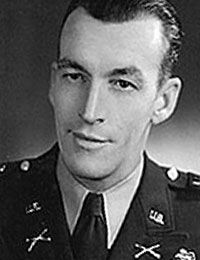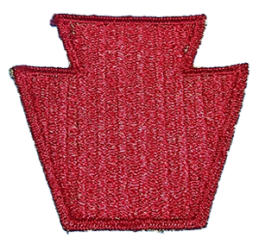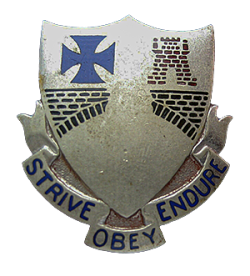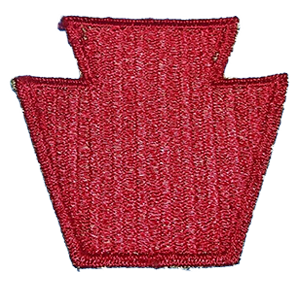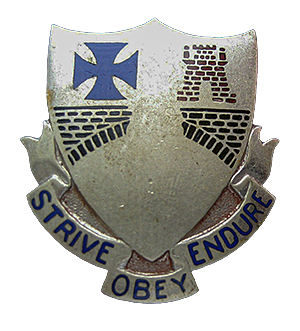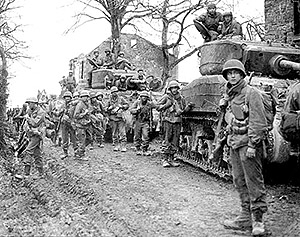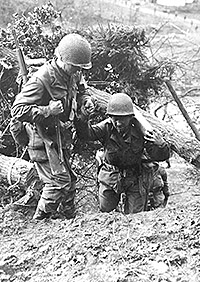In July 1940 I joined the Army. The Army was taking volunteers for troops to jump by parachute with plans of forming a parachute brigade.Since at that time it was experimental they wanted all troops the same size. I volunteered but was turned down as to tall. After the Army found that paratroops were successful they relaxed the requirements and I tried again and was accepted but only if the captain of the unit I was in would OK it. He called me into his office and asked me "Why would any one want to join the paratroops". I said: "Flying sounds better than foot slogging and besides the war will be over before they send us over". He replied: "If it's war you want hang in here we are going and very soon". So I didn't get in the paratroops and probably just as well.
We had been training in North & south Carolina on the biggest maneuvers the Army has ever conducted even to this day, then in Louisiana on maneuvers, from there to Florida for Anphibias (landing on beaches) Training and on to West Virginia on mountain and Ranger training. Three months before going overseas we had special physical training at Camp Pickett Virginia And I was a Judo instructor during that time
In October 1943 we sailed for the British Isles and was stationed in Whales England, training and waiting for D-Day. We didn't care much for the British soldiers but the girls were wonderful. When I did get into the war, in the first 15 minutes I wondered what the hell was my hurry to get over here. I aimed at the first German I saw but couldn't pull the trigger, it just didn't seem right to shoot a human being. After he ducked behind a heagerow I looked to my left and saw I had two dead in that few minutes. From then on it didn't bother me to pull a trigger. Oh Lord! be on my side this time cause its not sergeants I am fighting now. I am one and those Bastards are playing for keeps.
On August the third 1944 we were dug in for the night waiting to attack at daylight the next day. We were dug in two men to each hole so one could watch while the other got some sleep. Just at daylight I told Sandy the guy in the hole with me "this is the day I get it". It was a terrible feeling. We were all up and in position ready to go, waiting for the signal. It came and over the hedge row we went with all hell breaking lose. There was a railroad track across our front that we had to cross. Everyone got to the railroad ditch ok but when we came up out of the ditch to cross the tracks a machine gun mowed down most of the platoon. The radio man running beside me was hit and one side of his face was off and it hit me on my chest. I brushed it off and kept going. Within a few seconds the Lieutenant was hit and went down on the other side of me. I was about 40 feet from the machine gun and I could see that he was swinging his gun to get me and he did before I could get a shot off. I was sent flying bachwards. With a terrible pain in my stomach I thought I only had minutes to live but I wanted to eliminate the gun before I expired.
While reaching for a grenade on my belt I saw my left thumb was hanging and nearly gone but I pulled the pin and threw it, at that moment I saw Sandy coming at the gun position from the left and thought for sure that the grenade would get him too but it didn't. He jumped over the hedge and was crying while beating the hell out of the dead Germans with the butt of his B. A. R. (browning automatic rifle). I looked myself over and saw the reason for the awful pain each time I inhaled and saw a 8 inch piece like an arrow stuck in my gut. I took a big breath, took a hold of it and jerked it out and I'm not sure but think I passed out. When I knew my stomach wasn't shot away I knew then I would probably be ok and got up and ran back to the starting position. On the way I had run right in front of one of our machine guns but they saw me in time and quit firing. An aid man looked me over and said"Get back to the aid station " and pointed in the direction to go. Right then I discovered I was holding only the stock of my rifle. It had been shot out of my hands and the piece that had been stuck in my gut was a piece of the rifle barrel.
From the aid station I was sent to a field hospital about 15 miles to the rear. When I got there I saw wounded laying all over on stretchers waiting to be treated. Since I was a walking patient there was no hurry in my case so they sent me to a tent to wait. There were long rows of cots with other wounded waiting and I took a cot next to a Lieutenant who was sleeping. We were of course dirty and needed cleaning up and a shave so they had a German Prisoner of war come in to shave us. I was awake and knew what was going on but when he got to the Lieutenant next to me and woke him up all hell broke lose. He opened his eyes and saw the German standing over him and if it had not been for the ward boy he very well would have killed the German.
When it came my turn to get treated I was lying on a table and was so interested in watching a nurse that I didn't notice what the Doctor was doing. When I finally did notice, He was about to take my thumb off. I jumped off the table and said "you are not cutting it off". He said: "I'll be the judge of that, get back on the table or face a court martial”. I said "court martial and be dammed I knew he wasn't about to do that, so I was told to report to a tent and wait. The slip the nurse give me with the tent number on it turned out to be a tent for the sick and not the wounded and when I walked in they could see I was in the wrong place and were scared that I was a wounded and out of my head wondering around. It was straightened out and I was sent back to a Army hospital in England.
I left the Hospital in England and was sent back to my unit in France. I caught up with them on the outskirts of Paris. When I arrived there I wondered why I was in such a hurry to get back with them because there was only four men left that I knew all the rest had been killed or wounded. Our Division stopped fighting long enough to Parade through Paris and you have probably seen the postage stamp of us Parading down the main street. The Germans had taken off but when we got to the further outskirts, it was back to bullets and Artillery shells again. The civilians that had all come out to greet us were getting killed and wounded as well as our own. What a mess, we were all mixed up with them and a lot of the time they were getting in the way.
Two young girls were running along side of myself and the platoon aid man. One got hit in the groin by a piece of shrapnel and we dragged her into a store doorway. She was screaming and crying. An old man laying by the curb was in worse shape than the girl and I was waiting for a let up in the firing so I could maybe drag him into the doorway but it was to fierce. With the girl screaming and crying along with the shooting and explosions I couldn't make out what the Aid man was trying to tell me but I knew by the look on his face he was concerned about the girl. I kneeled down and said: "Don't just sit there, help her and he replied". I never worked on a woman before". I said: "now is your chance". He looked at where the girls wound was and slowly raised his head to look at me with a bewildered look on his face. Don't know how I could laugh at a time like that but I was about to bust a gut. All the other civilians huddled in the doorway looked at me like I had lost my senses. I don't suppose they could understand English so they didn't know what it was all about. I yelled at the Aid Man: "come along when you get done there" and I headed off down the street to the next doorway. We were fighting from doorway to doorway. As the Germans moved back we moved forward. Later that day I was running along the side of a building when a machine gun burst hit the wall just in front of me and I felt my cheek get hit but when I scooted into a doorway I felt of my cheek and picked a piece of stone out of my face.
It was just getting dark when I next saw the Aid Man and he put some kind of crap on it and I was OK. When he was dabbing my cheek I asked him if he washed his hands after messing with that girl and he said a few nasty words. We lost three men in my platoon that day. I had no way of knowing if they were wounded or KIA. The aid man told me the old man by the curb was dead before he left.
